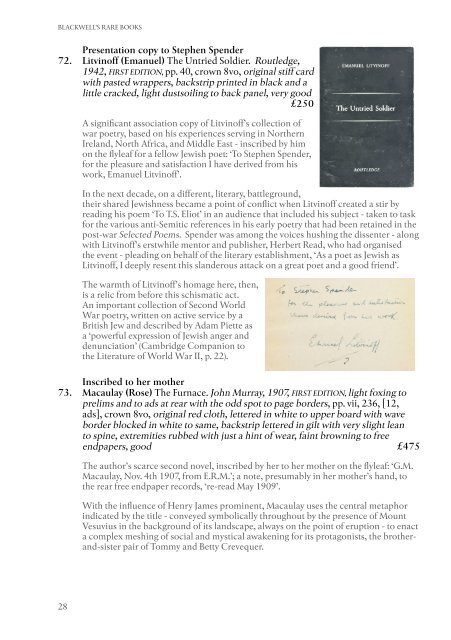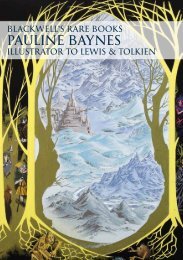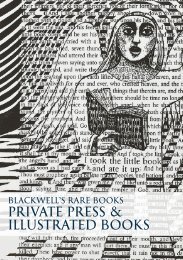You also want an ePaper? Increase the reach of your titles
YUMPU automatically turns print PDFs into web optimized ePapers that Google loves.
BLACKWELL’S RARE BOOKS<br />
Presentation copy to Stephen Spender<br />
72. Litvinoff (Emanuel) The Untried Soldier. Routledge,<br />
1942, FIRST EDITION, pp. 40, crown 8vo, original stiff card<br />
with pasted wrappers, backstrip printed in black and a<br />
little cracked, light dustsoiling to back panel, very good<br />
£250<br />
A significant association copy of Litvinoff’s collection of<br />
war poetry, based on his experiences serving in Northern<br />
Ireland, North Africa, and Middle East - inscribed by him<br />
on the flyleaf for a fellow Jewish poet: ‘To Stephen Spender,<br />
for the pleasure and satisfaction I have derived from his<br />
work, Emanuel Litvinoff’.<br />
In the next decade, on a different, literary, battleground,<br />
their shared Jewishness became a point of conflict when Litvinoff created a stir by<br />
reading his poem ‘To T.S. Eliot’ in an audience that included his subject - taken to task<br />
for the various anti-Semitic references in his early poetry that had been retained in the<br />
post-war Selected Poems. Spender was among the voices hushing the dissenter - along<br />
with Litvinoff’s erstwhile mentor and publisher, Herbert Read, who had organised<br />
the event - pleading on behalf of the literary establishment, ‘As a poet as Jewish as<br />
Litvinoff, I deeply resent this slanderous attack on a great poet and a good friend’.<br />
The warmth of Litvinoff’s homage here, then,<br />
is a relic from before this schismatic act.<br />
An important collection of Second World<br />
War poetry, written on active service by a<br />
British Jew and described by Adam Piette as<br />
a ‘powerful expression of Jewish anger and<br />
denunciation’ (Cambridge Companion to<br />
the Literature of World War II, p. 22).<br />
Inscribed to her mother<br />
73. Macaulay (Rose) The Furnace. John Murray, 1907, FIRST EDITION, light foxing to<br />
prelims and to ads at rear with the odd spot to page borders, pp. vii, 236, [12,<br />
ads], crown 8vo, original red cloth, lettered in white to upper board with wave<br />
border blocked in white to same, backstrip lettered in gilt with very slight lean<br />
to spine, extremities rubbed with just a hint of wear, faint browning to free<br />
endpapers, good £475<br />
The author’s scarce second novel, inscribed by her to her mother on the flyleaf: ‘G.M.<br />
Macaulay, Nov. 4th 1907, from E.R.M.’; a note, presumably in her mother’s hand, to<br />
the rear free endpaper records, ‘re-read May 1909’.<br />
With the influence of Henry James prominent, Macaulay uses the central metaphor<br />
indicated by the title - conveyed symbolically throughout by the presence of Mount<br />
Vesuvius in the background of its landscape, always on the point of eruption - to enact<br />
a complex meshing of social and mystical awakening for its protagonists, the brotherand-sister<br />
pair of Tommy and Betty Crevequer.<br />
28




